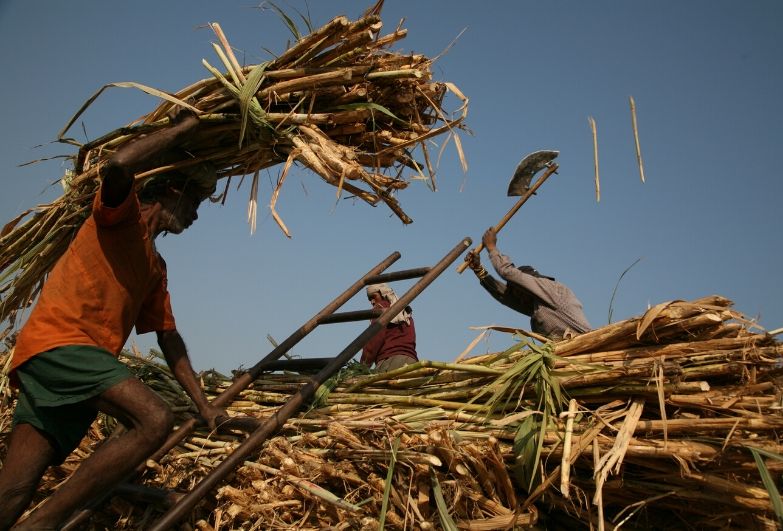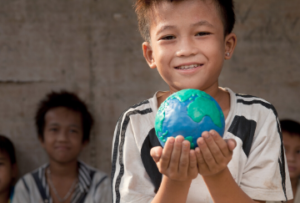Disclaimer: This article is more than 3 years old, and may not include the most up-to-date information or statistics. Please verify information with more recent sources as needed, and if you have any questions contact our Press Office.
Short term and long term measures that build resilience and prevent an increase in modern slavery. A blog by Ryna Sherazi

As we provide emergency outreach and support to at-risk communities – food, hygiene materials, education and information – we are also observing and documenting the coronavirus-related impacts in order to build resilience and prevent an increase in modern slavery.
We know that Covid-19 has the potential to negatively affect everyone on earth, but it will not affect everyone equally. The need to isolate, to retain a livelihood, to access healthcare and withstand the economic shock of lost income, coupled with sharp inflationary prices, are all likely to affect the poor far more severely than the rich. When people face significantly limited options in their normal circumstances – because they are poor, discriminated against, marginalised, and largely unprotected by national laws – Covid-19 is likely to cause a significant deterioration in their health and chances of survival. It is people with these limited options who are so commonly exploited in modern slavery.
Anti-Slavery International has worked for 180 years with the world’s most vulnerable people to ensure that we see a final end to modern slavery, and realise freedom from slavery for everyone, everywhere, always. Over the past few weeks, our conversations with grassroots partners in the UK and overseas have highlighted the negative impact, not just of the virus itself, but how governments and global businesses are responding to the virus threat. These include instant cancellations of manufacturing contracts without commitment to securing the health and welfare of already low-paid workers; government lockdowns which effectively limit access to cash benefits that families need to put food on the table to survive and; people without the luxury to self isolate or social distance. The list goes on.
To seriously tackle the global Covid-19 pandemic, and its effects, governments, businesses, donors and international agencies must be proactive in reaching and supporting the world’s most vulnerable and most marginalised people. A response that meets short term needs it important, but a long term change is required to ensure the sustainability of those short term measures, while safeguarding millions from the threat of exploitation.
Since the beginning of this crisis Anti-Slavery International have been working with partners, donors and civil socity around the world to collect data on the effects of Covid-19 on vulnerable communities. From this data Anti-Slavery International has published Leaving No-one Behind; insights and recommendations for governments, donors, businesses and international agencies to help with the global response to Covid-19, with the intention to ensure that these short and long term measures will reach the 40 million people in modern slavery.

Leaving No-One Behind
Short term and long term measures to build resilience and prevent an increase to modern slavery
The insights from grassroots organisations are sobering: increased risks to those in slavery, and more people at risk of being exploited in modern slavery; worsening discrimination; increased risks for migrant workers, many of whom are at risk of modern slavery; and the activities undertaken by grassroots organisations to keep people safe from exploitation are being severely disrupted.
Considering the heightened risks faced by people in already-vulnerable situations, Anti-Slavery International has outlined what responses should be, in both the short term as we face this crisis, and the longer term, so that our post-Covid-19 world will be closer to a world free from slavery.
There is an immediate need to carry out the following:
- Ensure inclusion: support provided during Covid-19, including medical treatment, testing and social assistance, must be communicated and provided in a way that is accessible to all people including those affected by, and vulnerable to, slavery.
- Provide meaningful protection: social and financial support, equivalent to the living wage in each country need to be available to all workers who have lost their income due to lay-offs resulting from the crisis. That support also needs to reach and protects migrant, informal and undocumented workers. Businesses must honour contracts within their supply chains, undertake human rights due diligence and ensure their actions do not cause increased vulnerabilities for workers. Government workplace labour inspections should continue, where possible, during Covid-19.
- Mitigate against the risk of further vulnerability: victim protection and support, including identification, must not be disrupted during Covid-19. Immigration enforcement including detention should be suspended during the crisis.
As the crisis begins to pass, there is a long term need to:
- Increase resilience: consider the needs of people already enslaved as well as those with increased vulnerability to exploitation. As the crisis begins to pass, there is a need to build back better, and create economies and communities that value everyone, everywhere, always.
- Improve prevention measures: provide all people with long-term social protections that ensure minimum wages meet living needs, to reduce the vulnerability to exploitation and modern slavery. This should be combined with efforts by governments to reduce debt-bondage (a major driver of modern slavery) by cancelling debts and providing direct cash transfers to people living in, and vulnerable to, slavery; to ensure that their basic needs are met.
- Improve business responsibility: buyer-supplier relationships should ensure respect for workers’ rights and pricing should cover living wage and benefits to all workers in a companie’s supply chain. Governments must introduce mandatory human rights and environmental due diligence laws to hold companies responsible for preventing abuses within their supply chains.
Anti-Slavery International, along with partners Free the Slaves and the Freedom from Slavery Forum, are collating information from across a broad range of grassroots organisations working on anti-slavery measures. Our aim is to jointly advocate for any responses to Covid-19 to put people affected by slavery at their heart. We welcome input from organisations active in the anti-slavery sector. Responses are being gathered here until 8th May 2020.
Covid-19 will undoubtedly hit the poor hardest. How we respond to this pandemic poses questions about how we treat and protect society’s most vulnerable people. Our answer to those questions provide us with an opportunity to build back better; a society that undervalues no-one and helps us to truly realise a world where everyone, everywhere is in freedom.
For further information on the report contact: r.sherazi@antislavery.org





